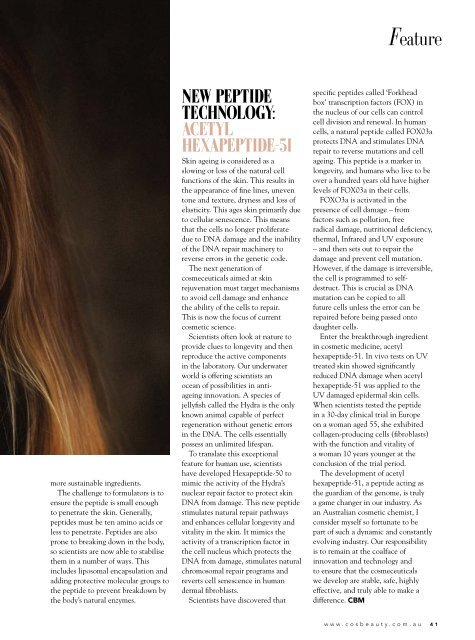CosBeauty Magazine #79
CosBeauty is the #BeautyAddict's guide to lifestyle, health and beauty in Australia. This issue we look at 30+ products to make your bathroom a spa, why you need these ultimate skin savers, wellness trends for 2018, a year of global festivals and shape shifters; your best body ever!
CosBeauty is the #BeautyAddict's guide to lifestyle, health and beauty in Australia. This issue we look at 30+ products to make your bathroom a spa, why you need these ultimate skin savers, wellness trends for 2018, a year of global festivals and shape shifters; your best body ever!
You also want an ePaper? Increase the reach of your titles
YUMPU automatically turns print PDFs into web optimized ePapers that Google loves.
Feature<br />
more sustainable ingredients.<br />
The challenge to formulators is to<br />
ensure the peptide is small enough<br />
to penetrate the skin. Generally,<br />
peptides must be ten amino acids or<br />
less to penetrate. Peptides are also<br />
prone to breaking down in the body,<br />
so scientists are now able to stabilise<br />
them in a number of ways. This<br />
includes liposomal encapsulation and<br />
adding protective molecular groups to<br />
the peptide to prevent breakdown by<br />
the body’s natural enzymes.<br />
New peptide<br />
technology:<br />
Acetyl<br />
Hexapeptide-51<br />
Skin ageing is considered as a<br />
slowing or loss of the natural cell<br />
functions of the skin. This results in<br />
the appearance of fine lines, uneven<br />
tone and texture, dryness and loss of<br />
elasticity. This ages skin primarily due<br />
to cellular senescence. This means<br />
that the cells no longer proliferate<br />
due to DNA damage and the inability<br />
of the DNA repair machinery to<br />
reverse errors in the genetic code.<br />
The next generation of<br />
cosmeceuticals aimed at skin<br />
rejuvenation must target mechanisms<br />
to avoid cell damage and enhance<br />
the ability of the cells to repair.<br />
This is now the focus of current<br />
cosmetic science.<br />
Scientists often look at nature to<br />
provide clues to longevity and then<br />
reproduce the active components<br />
in the laboratory. Our underwater<br />
world is offering scientists an<br />
ocean of possibilities in antiageing<br />
innovation. A species of<br />
jellyfish called the Hydra is the only<br />
known animal capable of perfect<br />
regeneration without genetic errors<br />
in the DNA. The cells essentially<br />
possess an unlimited lifespan.<br />
To translate this exceptional<br />
feature for human use, scientists<br />
have developed Hexapeptide-50 to<br />
mimic the activity of the Hydra’s<br />
nuclear repair factor to protect skin<br />
DNA from damage. This new peptide<br />
stimulates natural repair pathways<br />
and enhances cellular longevity and<br />
vitality in the skin. It mimics the<br />
activity of a transcription factor in<br />
the cell nucleus which protects the<br />
DNA from damage, stimulates natural<br />
chromosomal repair programs and<br />
reverts cell senescence in human<br />
dermal fibroblasts.<br />
Scientists have discovered that<br />
specific peptides called ‘Forkhead<br />
box’ transcription factors (FOX) in<br />
the nucleus of our cells can control<br />
cell division and renewal. In human<br />
cells, a natural peptide called FOX03a<br />
protects DNA and stimulates DNA<br />
repair to reverse mutations and cell<br />
ageing. This peptide is a marker in<br />
longevity, and humans who live to be<br />
over a hundred years old have higher<br />
levels of FOX03a in their cells.<br />
FOXO3a is activated in the<br />
presence of cell damage – from<br />
factors such as pollution, free<br />
radical damage, nutritional deficiency,<br />
thermal, Infrared and UV exposure<br />
– and then sets out to repair the<br />
damage and prevent cell mutation.<br />
However, if the damage is irreversible,<br />
the cell is programmed to selfdestruct.<br />
This is crucial as DNA<br />
mutation can be copied to all<br />
future cells unless the error can be<br />
repaired before being passed onto<br />
daughter cells.<br />
Enter the breakthrough ingredient<br />
in cosmetic medicine, acetyl<br />
hexapeptide-51. In vivo tests on UV<br />
treated skin showed significantly<br />
reduced DNA damage when acetyl<br />
hexapeptide-51 was applied to the<br />
UV damaged epidermal skin cells.<br />
When scientists tested the peptide<br />
in a 30-day clinical trial in Europe<br />
on a woman aged 55, she exhibited<br />
collagen-producing cells (fibroblasts)<br />
with the function and vitality of<br />
a woman 10 years younger at the<br />
conclusion of the trial period.<br />
The development of acetyl<br />
hexapeptide-51, a peptide acting as<br />
the guardian of the genome, is truly<br />
a game changer in our industry. As<br />
an Australian cosmetic chemist, I<br />
consider myself so fortunate to be<br />
part of such a dynamic and constantly<br />
evolving industry. Our responsibility<br />
is to remain at the coalface of<br />
innovation and technology and<br />
to ensure that the cosmeceuticals<br />
we develop are stable, safe, highly<br />
effective, and truly able to make a<br />
difference. CBM<br />
www.cosbeauty.com.au 41


















